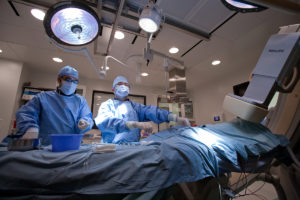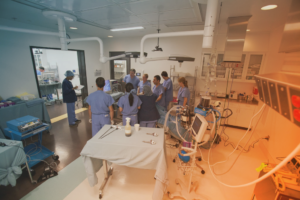How GCMI and T3 Labs is supporting Dr. Lindon Young’s novel therapy to significantly reduce cardiovascular reperfusion injuries.
During events such as myocardial infarction (heart attack) and surgical procedures involving angioplasty, bypass surgery, or heart transplantation, reactive oxygen species (ROS) can be generated, which cause organ and blood vessel damage. ROS is generated from four primary sources in cardiac tissue after myocardial infarction and restoration of blood flow to the previously ischemic heart tissue (i.e. reperfusion injury). The sources include 1) mitochondria 2) NADPH oxidase 3) uncoupled endothelial nitric oxide synthase and xanthine oxidase. Our novel treatment is aimed to prevent the generation of ROS from all four of these sources. ROS generated from these sources is known to extend the infarct size after myocardial infarction and is a key component of reperfusion injury.

Lindon H. Young. Image credit: PCOM
“Lindon H. Young is the director of the Endocrinology and Introduction to Human Disease and Therapeutics courses in the DO program at the Philadelphia College of Osteopathic Medicine (PCOM), and teaches in the Master of Science in Biomedical Sciences program at PCOM.
Dr. Young specializes in the area of cardiovascular pharmacology and has mentored numerous MS, DO/PhD students and residents from 2002 to present on various research projects that range from cellular based assays to human studies.”
He has 25 years of preclinical study experience.
Decades of research led to a license to commercialize his team’s intellectual property from PCOM followed by the opportunity – and successful completion – for an SBIR Phase I grant in 2021 intended to inhibit the production of these [ROS] chemicals and reduce the resultant damage in myocardial ischemia/reperfusion (I/R) injury.
In Lindon’s own words, “The [preclinical] study involves inducing ischemia in a pig using a balloon catheter in the left anterior ventricular coronary artery for one hour, followed by reperfusion for over three hours. Treatment with the test article will occur at the onset of reperfusion via an intra-arterial administration through the left anterior descending artery of the left coronary artery. Samples (blood samples, to measure troponin I, creatine phospho kinase, and myoglobin) and measurements (left ventricular ejection fraction, EKG readings, heart rate, mean arterial blood pressure [systolic pressure plus two-thirds of diastolic pressure] and pulmonary arterial pressure) will be taken over the course of the procedure. The animal will then be terminated to observe the heart tissue and effects of treatment. Dyes, such as Evans blue will be used to determine the area at risk (AR) and triphenyltetrazolium chloride will be used to determine the area of necrosis (AN) and extent of tissue damage [AN/AR]. If successful, these treatments could be used to help reduce damage to the heart from ROS during procedures such as percutaneous coronary intervention (PCI) after heart attack. Additionally, this treatment is aimed at improving the heart function and reducing the rate of hospitalizations/morbidity post myocardial infarction.”
Excellence in preclinical starts with pre-testing advisory services including protocol development
Lindon was introduced to T3 Labs by David Lefer, Professor of Pharmacology at LSU. Dr . David Lefer is the son of the late Dr. Allan Lefer. Dr. Allan Lefer was Lindon’s post-doctoral supervisor at Thomas Jefferson University from 1999 to 2001.
GCMI and our preclinical arm, T3 Labs, helped refine Lindon’s SBIR Phase I grant application with a tweak to study protocols in order to more closely mirror clinical application. The protocol, originally drafted as IV to jugular, was changed to intra-arterial, based on early surgical input.
 “The surgeons told us they are most likely to deliver this therapy straight to the artery,” Lindon said. “Adopting a protocol that more closely mirrors the actual clinical application in humans, was a high value recommendation brought forth in advance of the in-vivo preclinical work. Working with the great team at T3 Labs has dramatically improved the timeline to test the novel molecules in the clinic, most notably to heart attack patients receiving percutaneous coronary intervention (PCI).”
“The surgeons told us they are most likely to deliver this therapy straight to the artery,” Lindon said. “Adopting a protocol that more closely mirrors the actual clinical application in humans, was a high value recommendation brought forth in advance of the in-vivo preclinical work. Working with the great team at T3 Labs has dramatically improved the timeline to test the novel molecules in the clinic, most notably to heart attack patients receiving percutaneous coronary intervention (PCI).”
Preclinical findings and data to date
“The T3 Labs team gave us great advice outside of our area of expertise on the procedure even if it meant protocol deviation, on the fly, because of their high level of confidence in clinical relevance.
“In one particular instance, we had to wait 23 minutes to administer the test agent (YT-004) while the team administered 17 defibrillation shocks to save the subject. While the protocol called for administration of the test agent (YT-004) as soon as blood flow is restored, the team and surgeons advised that in a clinical setting, they would still administer the test agent (YT-004) in the same circumstance. After all of that, the cardiac function returned to baseline (pre-ischemia) values (~normal ejection fraction is ~60%)!”
“Ultimately we have learned that there is a direct correlation between the ex vivo cardiac studies to the in vivo cardiac studies conducted at T3 Labs,” Lindon said.
“The personnel at T3 Labs has randomized the treatments (test and control agents) and have implemented rigorous study design protocol (e.g. location of area at risk) to enable clear and concise reproducibility of the in-vivo myocardial infarction model to render valid comparisons between the test and control compounds used in the study protocol,” Lindon wrote. “We have completed testing of the first test agent and the results indicate a robust reduction in infarct size (i.e. 70% reduction) in the test compound vs.the control compound group accompanied with significant improvement in post-MI cardiac function.”
SBIR Phase II within 12 months of PhaseI? It’s possible.
Young Therapeutics, a PCOM university start-up Life Sciences company, plans to finish testing of the second test compound in April, 2022.
“The encouraging results that have already been obtained with the first compound should enable us to submit the SBIR Phase II application in September 2022,” Lindon said. “If all goes well, as we expect, funding could be available within the next year to conduct a long-term survival study to monitor the effectiveness of our test agent(s) to mitigate cardiac remodeling and subsequent heart failure.
 “The personnel at T3 Labs are highly trained professionals who offer their expertise to carry out the study design and offer excellent recommendations on how to improve the reliability of the data collected from the studies. They are a very conscientious group of people who work together as a great team to accomplish research objectives in an effective manner.
“The personnel at T3 Labs are highly trained professionals who offer their expertise to carry out the study design and offer excellent recommendations on how to improve the reliability of the data collected from the studies. They are a very conscientious group of people who work together as a great team to accomplish research objectives in an effective manner.
“I would highly recommend and strongly endorse T3 Labs as the ‘Go To’ contract research organization to conduct preclinical research studies. We look forward to establishing a long-term relationship to conduct both Phase I and Phase II SBIR studies to move novel therapeutics into the clinic within three years. This has been one of the most rewarding experiences I have ever experienced in my research career and we are very appreciative of their outstanding professionalism.”
GCMI and T3 Labs proudly support Lindon and his team’s work. We are grateful for his time and confidence in our ability to help bring his therapy to life.
